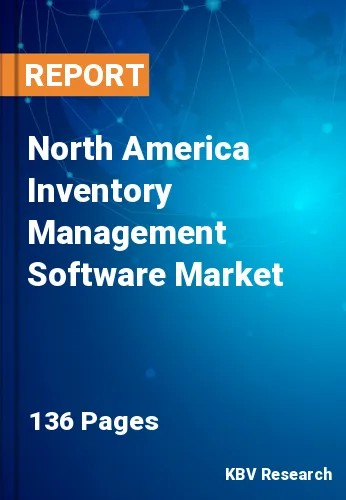The North America Inventory Management Software Market would witness market growth of 10.4% CAGR during the forecast period (2023-2030).
One of the primary uses of IMS is real-time inventory tracking. Businesses can monitor stock levels, track movement, and receive instant updates on inventory changes. This feature is crucial for preventing stockouts, backorders, and overstock situations. IMS utilizes advanced algorithms and historical data to predict future demand. Efficient order processing is a key component of inventory management. IMS automates order fulfillment processes, reducing the time and effort required for manual handling. This results in quicker order turnaround times and improved customer satisfaction. IMS facilitates effective supplier relationship management by providing insights into supplier performance, lead times, and pricing.
The shift towards cloud-based IMS is a notable trend in the market. Cloud solutions offer scalability, accessibility, and cost-effectiveness, allowing businesses to access their inventory data anywhere. The integration of IMS with Internet of Things (IoT) devices is gaining traction. This enables real-time inventory monitoring through sensors and connected devices, providing granular visibility into the supply chain. IoT integration enhances data accuracy and facilitates proactive decision-making. These technologies enable predictive analytics, helping businesses anticipate demand patterns, identify trends, and make informed decisions for inventory optimization.
As per the International Trade Administration, the US automotive industry is one of the world's largest. In 2020, the United States sold 14.5 million light vehicles. The United States is the world's second-largest vehicle sales and production region. According to Autos Drive America, global automakers produced 5 million vehicles in the United States in 2020. IMS provides the tools to manage inventory levels, track product availability, and synchronize data across various online sales channels in Mexico. The Mexican Online Sales Association estimates that the domestic e-commerce sector was worth USD 19.7 billion in 2021, an increase of 27% over 2020. In 2021, there were 57.5 million users of Mexican eCommerce, up 11% from the previous year. In 2020, women made up 51% of Mexican eCommerce users. The factors mentioned above will drive the regional market growth.
The US market dominated the North America Inventory Management Software Market by Country in 2022 and would continue to be a dominant market till 2030; thereby, achieving a market value of $1,156.6 million by 2030. The Canada market is experiencing a CAGR of 12.9% during (2023 - 2030). Additionally, The Mexico market would exhibit a CAGR of 11.9% during (2023 - 2030).
Based on Enterprise Type, the market is segmented into Large Enterprises, and Small & Medium Enterprises (SMEs). Based on Deployment, the market is segmented into On-premises, and Cloud. Based on End-use, the market is segmented into Manufacturing, Retail & Consumer Goods, Automotive, Energy & Utilities, Healthcare, and Others. Based on Application, the market is segmented into Inventory Control & Tracking, Order Management, Asset Management, Scanning & Barcoding, and Others. Based on countries, the market is segmented into U.S., Mexico, Canada, and Rest of North America.
Free Valuable Insights: The Inventory Management Software Market is Predict to reach $4.7 Billion by 2030, at a CAGR of 11.2%
The market research report covers the analysis of key stake holders of the market. Key companies profiled in the report include Zoho Corporation Pvt. Ltd., IBM Corporation, Oracle Corporation, Lightspeed Commerce Inc., CIN7 Limited, Linnworks, Intuit Inc., Acumatica, Inc., Fishbowl Inventory and Brightpearl (Sage Group plc).
By Enterprise Type
By Deployment
By End-use
By Application
By Country
Our team of dedicated experts can provide you with attractive expansion opportunities for your business.

